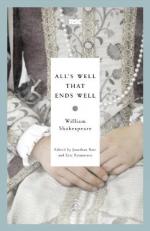|
This section contains 6,901 words (approx. 24 pages at 300 words per page) |

|
SOURCE: Richard, Jeremy. “‘The Thing I Am’: Parolles, the Comedic Villain, and Tragic Consciousness.” Shakespeare Studies 18 (1986): 145-59.
In the following essay, Richard traces Shakespeare's transition from comedies of plot to tragedies of character through an examination of the comedic villains of the problem plays, focusing in particular on Parolles in All's Well That Ends Well.
If, as F. P. Wilson puts it, Shakespeare at the start of the Jacobean decade is looking for a “style that could express the mind as it was in action,” then the “problem” comedies illustrate the troubled labor that will forge that style.1 The earlier “festive” comedies depend on characters overcoming obstacles that the outside world places in the way of a happy ending. Caskets must be properly judged before there can be a marriage, groups of twins must assemble before families are reunited, and younger sons must prove their merit before acceding...
|
This section contains 6,901 words (approx. 24 pages at 300 words per page) |

|


